

The Symfony Blog. Rfc:void_return_type. Version: 0.2.1 Date: 2015-02-14 (v0.1, later withdrawn), 2015-10-14 (v0.2, revival) Author: Andrea Faulds, ajf@ajf.me Status: Implemented (PHP 7.1) Introduction The Return Types RFC has introduced return types to PHP.
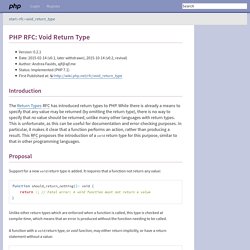
While there is already a means to specify that any value may be returned (by omitting the return type), there is no way to specify that no value should be returned, unlike many other languages with return types. This is unfortunate, as this can be useful for documentation and error-checking purposes. In particular, it makes it clear that a function performs an action, rather than producing a result.
Proposal Support for a new void return type is added. Unlike other return types which are enforced when a function is called, this type is checked at compile-time, which means that an error is produced without the function needing to be called. A function with a void return type, or void function, may either return implicitly, or have a return statement without a value: Rationale. Upcoming changes in PHP 7.1 — dotdev. Warn about invalid strings in arithmetic When performing arithmetic in PHP, the language will gracefully (or not, depending on how you want to look at it) handle mixing integer values with string based numeric values.
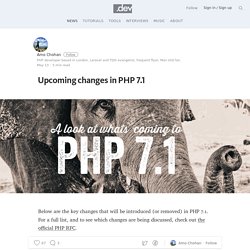
Take the following examples: <? Php //Results in 10$total = 5 + 5; // Results in 10$total = '5' + '5'; // Results in 10$total = 5+ '5'; // Results in 10$total = 'I ate 3 bananas yesterday' + 'and I ate 7 bananas today'; // Results in 5$total = 5 + 'I love bananas'; Example four contains numeric values, so everything else is stripped out, and the sum of those are used to calculate the total of 10.
The last example really does throw a spanner in the works. With PHP 7.1, examples four and five will return: Notice: A non well formed numeric string encountered in file.php on line x This does introduce some backwards compatibility issues, as warnings will be shown where they were previously handled silently. Veille technologique Php. PHP. 80 Best Frameworks to Make Easy Web Development. Today we are going to share best framework to make easy web development and web design.
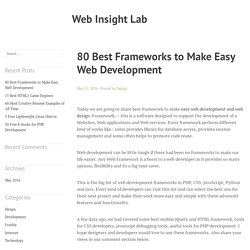
Framework: – this is a software designed to support the development of a Websites, Web applications and Web services. Every framework perform different kind of works like : some provides library for database access, provides session management and some often helps to promote code reuse. Web development can be little tough if there had been no frameworks to make our life easier. Any Web Framework is a boon to a web developer as it provides so many options, flexibility and its a big time saver. This is the big list of web development frameworks in PHP, CSS, JavaScript, Python and Java. A few days ago, we had covered some best mobile jQuery and HTML framework, tools for CSS developers, javascript debugging tools, useful tools for PHP development. PHP 1) Yiiframework Yii is a high-performance component-based PHP framework for developing large-scale Web applications. 2) Codeigniter 3) Cakephp 4) Phpdevshell. Comparatif des CMS PHP (systèmes de gestion de contenu)
PHP fête ses 20 ans cette année. La version 1.0 de PHP a été lancée en 1995.
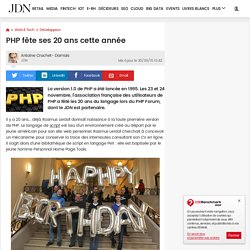
Les 23 et 24 novembre, l'association française des utilisateurs de PHP a fêté les 20 ans du langage lors du PHP Forum, dont le JDN est partenaire. Il y a 20 ans... déjà, Rasmus Lerdof donnait naissance à la toute première version de PHP. Le langage de script est issu d'un environnement créé au départ par le jeune américain pour son site web personnel. Rasmus Lerdof cherchait à concevoir un mécanisme pour conserver la trace des internautes consultant son CV en ligne. Il s'agit alors d'une bibliothèque de script en langage Perl : elle est baptisée par le jeune homme Personnal Home Page Tools. C'est le 8 juin 1995 que Rasmus Lerdof publie la version 1.0 de PHP (voir la page Web). L'ère Andi Gutmans et Zeev Suraski L'apparition d'une communauté open source A partir de 1997, deux nouveaux venus prennent les commandes du projet : Andi Gutmans et Zeev Suraski. PHP 7 : la nouvelle version de PHP au crible.
Quelles sont les principales évolutions de la nouvelle version du langage de script serveur ?
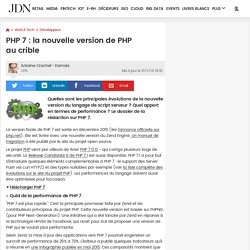
Quel apport en termes de performance ? Le dossier de la rédaction sur PHP 7. La version finale de PHP 7 est sortie en décembre 2015 (lire l'annonce officielle sur php.net). Elle est livrée avec une nouvelle version du Zend Engine. Un manuel de migration a été publié par le site du projet open source.